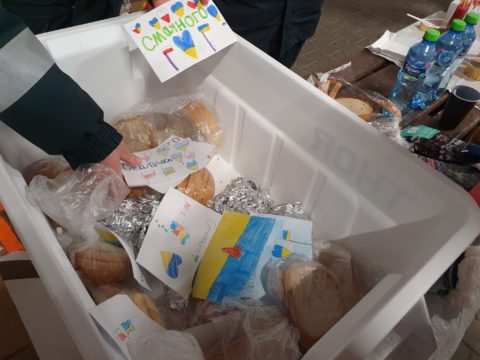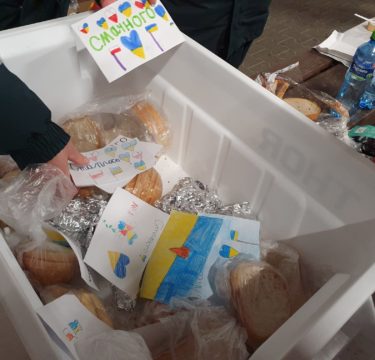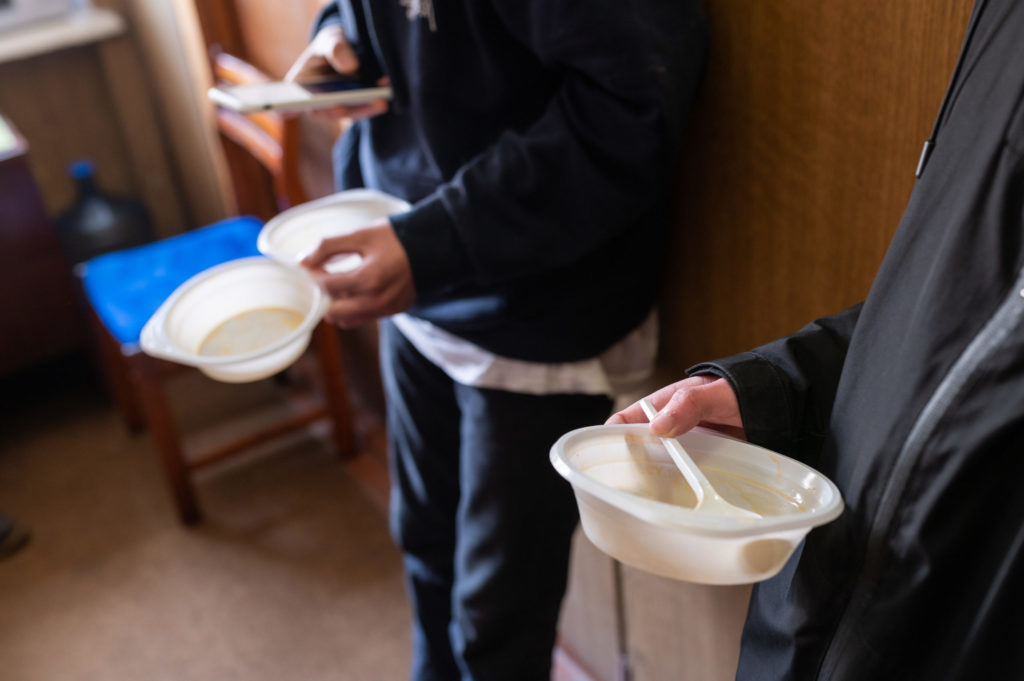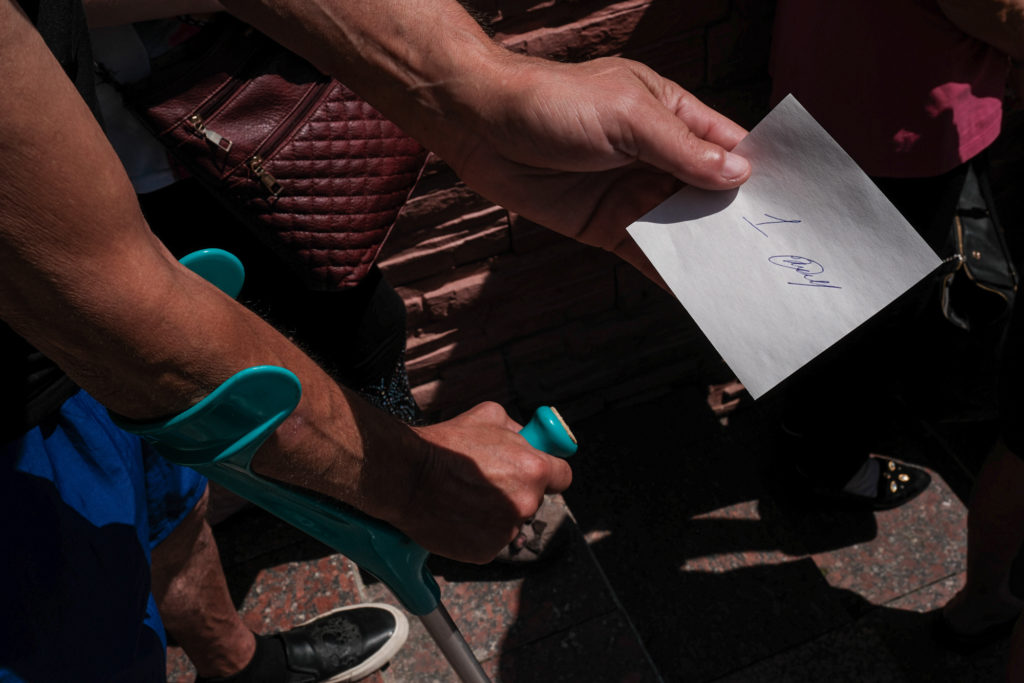Assisting Individuals Experiencing Homelessness from Ukraine in Poland


The full-scale war in Ukraine has led to the arrival in Poland of individuals who were already in vulnerable situations before February 24, 2022. Among them are Yuliia from Kherson, who fled the war and domestic violence with her five-year-old son; Anton, who struggles with mental health issues and intellectual disability; and 60-year-old Yana, who has been experiencing homelessness for over 20 years.
The Trauma of Violence and War
Yuliia and her then five-year-old son, Adrian, fled Kherson not only because of the war but also to escape the domestic violence perpetrated by her husband, Adrian’s father. Currently, the mother and son reside in a Collective Accommodation Center (OZZ) in Kraków. Due to her experiences, Yuliia suffers from severe depression and struggles with alcohol addiction. The OZZ has a strict ban on alcohol consumption and being on the premises under its influence. For Yuliia, this could mean losing her shelter. Despite this, she perseveres, working two cleaning jobs. She desperately wants to overcome her addiction, become independent, and move into a rented apartment. Above all, she wants a good life for her son. Adrian has learned Polish, is doing well in school, and has friends. However, the experience of violence, fleeing the war, and the uncertain situation have resulted in aggression and difficulties with emotional regulation for the boy. He needs therapy.
Alcohol abuse is a frequent cause of losing one’s place in an OZZ and homelessness among refugees in Poland. Without adequate support, the situation of the mother and son could soon become dire.
Kompas PCPM – a newsletter to help you find your way. With it, you can distinguish myths from facts and learn more about aid. Subscribe today here.
Exclusion Squared
Anton lived his whole life in Donetsk. He has a mild intellectual disability and has struggled with schizophrenia since childhood. Consequently, he only has basic education. At the age of 18, he had to leave his family home. He was allocated social housing and worked as a flyer distributor for 15 years. He managed, living modestly from one paycheck to the next. All of that changed when a bomb hit his apartment building in the early days of the full-scale war. He could no longer stay there. In Poland, he has not been able to get back on his feet. Due to his limited intellectual capacity, dealing with basic legal and residency matters was beyond his reach. The experience of war exacerbated his mental health problems. Initially, he lived in a collective accommodation center, but he got into a fight there and lost his place because of concerns for the safety of other residents. Shortly after, he ended up in a psychiatric hospital, and from there, he had nowhere to return. This is how he found himself in a tent on the street, where a social worker found him in winter. However, he could not return to either the hospital or the center. Shelters were afraid to take him in due to a lack of experience in working with individuals with such severe mental health challenges.0

I Know Every Corner; I Don’t Know Another Life
Ms. Yana knows the routes of all Warsaw buses by heart. She belongs to a generation that does not use smartphone maps. She knows the address of every institution, church, and aid organization. She knows how they help and their opening hours. She knows which supermarket dumpsters are unguarded and which are best to visit to find food and clothing. She has no other choice – she is not entitled to a pension. Walking with her through the city, one can rediscover it anew. Ms. Yana has been experiencing homelessness since 2004 after losing her property in Kyiv. She does not want to talk about it. She spent the warm months on the street, and in winter, she stayed with various people in exchange for housework. According to her, after the outbreak of the full-scale war, any semblance of a dignified life on the street became impossible. After arriving in Poland, she was given a place in an OZZ, where, due to old habits, she cannot adapt. Hoarding, lack of hygiene, and social maladjustment put her continued stay at the center in question.
The Project to Counter Homelessness Among Refugees from Ukraine in Poland
The situation of Yuliia, Anton, Yana, and many others can improve thanks to the multi-faceted efforts of the PCPM Foundation. The project covers Warsaw, Kraków, Silesia, Przemyśl, and surrounding areas. It increases access to assistance for non-Polish speakers with alcohol problems by funding medication, detoxification, and inpatient treatment. It creates and disseminates information materials in Polish and Ukrainian about available forms of assistance. It analyzes regulations regarding migration, social assistance, and aid to Ukrainian citizens to develop a publication, in cooperation with experts, on the rights and services for individuals with various legal statuses by state institutions and non-governmental organizations. It supports the activities of the Association of Ukrainians in Poland, Przemyśl Branch, which offers accommodation, psychological support, and a safe space for newly arrived refugees, with a particular focus on mothers with children.

In the coming months, the Foundation plans to organize training for personnel of social assistance units and organizations working in the field of foreigners’ rights to social support, co-financing for obtaining necessary residency documents (e.g., biometric passports), and expanding the medication co-financing program. The project will run until March 31, 2026, and its impact on access to social assistance for foreigners will be felt for a long time to come.
To learn more, visit the project website: https://pcpm.org.pl/osobomwkryzysie/ Registration for the aforementioned forms of assistance is possible via the website: https://forms.gle/rhenTxupAXK3RWUx6
At the request of the individuals featured in the text, their names have been changed.